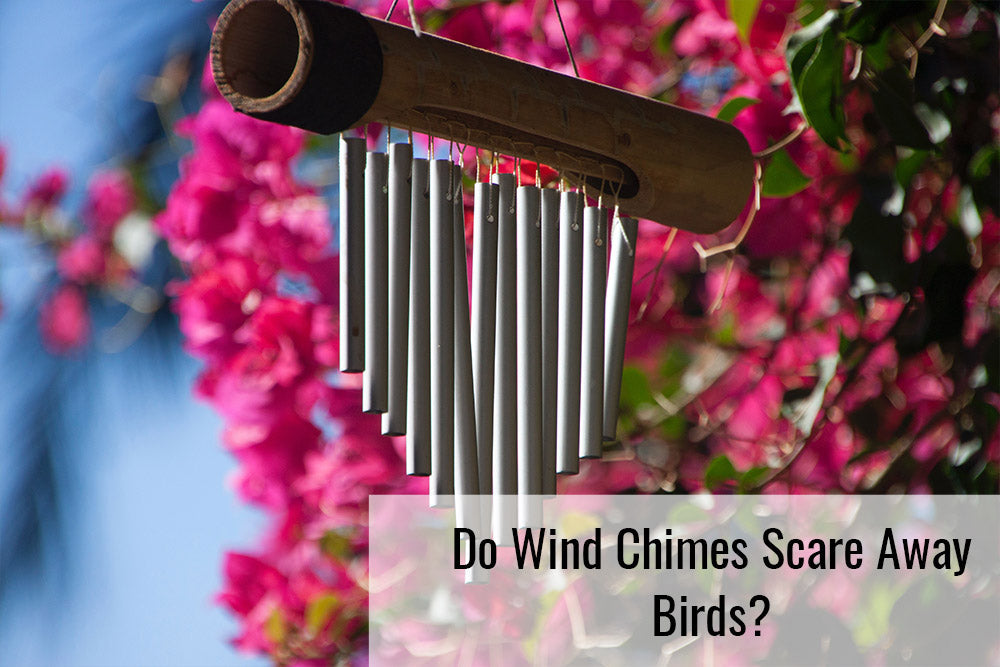Have you ever noticed birds fluttering away when the gentle tinkling of wind chimes fills the air? You might wonder if these melodic instruments serve more than just an aesthetic purpose.
Are birds genuinely afraid of wind chimes, or is it just a coincidence? You’re not alone in pondering this. In fact, many garden enthusiasts and bird lovers have asked the same question. Understanding this can help you create a more harmonious outdoor space and perhaps even protect your beloved garden from unwanted visitors.
Stay with us as we unravel the mystery behind birds and their reaction to these enchanting sounds. Who knows, the answer might surprise you and change how you perceive those charming chimes hanging in your backyard.

Credit: www.amazon.com
Birds And Their Sensory Perception
Birds possess unique sensory perception, allowing them to detect various stimuli. Wind chimes create unfamiliar sounds that might unsettle some birds. Their response can vary, with some avoiding the area, while others remain indifferent.
Birds and Their Sensory Perception Birds are fascinating creatures, with sensory abilities that often leave us in awe. Their perceptions of the world are quite different from ours, leading us to wonder how they interact with common objects like wind chimes. Do these decorative items, with their tinkling sounds and shiny surfaces, deter or intrigue our feathered friends? Understanding how birds hear and see can shed light on their reactions.Birds’ Hearing Abilities
Birds have an acute sense of hearing. They rely on it to communicate, find food, and detect predators. Unlike humans, birds can pick up on higher frequency sounds, which means they might hear wind chimes differently than we do. Imagine a quiet morning interrupted by a sudden clinking of metal. This could startle a bird, sending it fluttering away. Yet, some birds may not mind the noise at all, depending on their species and familiarity with the sound. Have you noticed different birds reacting differently to noise in your backyard? Their varied responses highlight the diversity in their hearing abilities.Visual Sensitivity In Birds
Birds see the world in a spectrum far beyond human capabilities. They can perceive ultraviolet light, helping them spot food and mates. This visual acuity could also mean they notice the slightest glint from a wind chime. A shiny surface catching the sun might intrigue a bird, much like a piece of jewelry catches your eye. On the other hand, the constant movement and reflections might be overwhelming, causing them to steer clear. Do you have wind chimes in your garden? Observe how different birds react to them. You might be surprised by what you discover. Understanding birds’ sensory perception not only helps in appreciating their world but also in making your garden a more inviting space for them. Next time you hang a wind chime, think about the sensory experience it creates for the birds around you.
Credit: www.amazon.com
Wind Chimes: A Brief Overview
Wind chimes have enchanted people for centuries. Their soothing sounds and artistic designs captivate many. Often found in gardens and patios, they add a touch of serenity. But what exactly are wind chimes, and how do they work?
Materials And Construction
Wind chimes come in various materials. Common choices include metal, wood, and glass. Each material affects the sound differently. Metal chimes often produce clear, resonant tones. Wooden chimes give off softer, mellow sounds. Glass chimes offer delicate, tinkling notes.
The construction of wind chimes also matters. Most consist of tubes or rods. These hang from a central structure. When the wind blows, the tubes collide. This collision creates the chime’s sound.
Variety Of Sounds Produced
Wind chimes produce a range of sounds. The pitch depends on the tube’s length and material. Longer tubes tend to make lower sounds. Shorter tubes produce higher tones. The arrangement of tubes influences the melody.
Some wind chimes are tuned to specific scales. These offer harmonious, musical notes. Others create random, unpredictable melodies. This variety allows for personalized soundscapes in any space.
How Birds React To New Stimuli
Birds are naturally curious and cautious creatures. They constantly face new stimuli in their environment. This can include changes in weather, unusual objects, or new sounds. Understanding how birds react to these stimuli helps explain their behavior. It also sheds light on why some birds might fear wind chimes.
Initial Fear Responses
When birds encounter something unfamiliar, they often react with caution. They might fly away or avoid the area. Wind chimes introduce new sounds and movements. These can be startling at first. A bird’s instinct is to stay safe. So, they might view wind chimes as a potential threat. The sudden noise and motion can trigger a fear response. This is common in many bird species.
Habituation Over Time
Birds have the ability to adapt to new stimuli. Over time, they can become accustomed to wind chimes. This process is called habituation. Birds may start to realize there is no real threat. Their fear diminishes as they become familiar with the sounds. Some birds might even perch nearby. They learn the wind chimes are harmless. Habituation can vary among different bird species. Some adapt quickly, while others take longer.
Role Of Wind Chimes In Bird Deterrence
Wind chimes produce gentle sounds and vibrations that may deter birds. These noises can create an unsettling environment. Birds often prefer quieter places, making wind chimes a potential bird deterrent.
Wind chimes are often seen as charming additions to gardens and patios, but do they serve a practical purpose in keeping birds at bay? Many homeowners have questions about their effectiveness as a bird deterrent. Understanding their role can help you decide if they’re a suitable solution for your space.Effectiveness In Gardens
Wind chimes create sound and movement, which can temporarily startle birds. The gentle clinking and swaying might deter some birds from perching or nesting nearby. I once hung a set near my vegetable patch, and for a while, it seemed like the birds kept their distance. Their reflective surfaces can also play a role. The glint of sunlight on metal can add an extra layer of deterrence. However, the impact varies with different bird species and individual behavior.Limitations Of Sound-based Deterrents
Despite their charm, wind chimes aren’t foolproof. Birds can become accustomed to repetitive sounds, especially if they realize there’s no real threat. My feathered visitors eventually returned, seemingly unfazed by the melodies overhead. Weather conditions can also affect their performance. On still days with no breeze, wind chimes fall silent, losing their deterrent power. So, is the gentle tinkle of wind chimes enough to protect your garden? Consider other deterrent methods too. Combining visual and sound tactics might be more effective. What works for one garden may not work for another. Always observe and adjust based on your garden’s needs.Scientific Studies On Birds And Wind Chimes
Wind chimes add charm to gardens. But do they scare birds? Scientists have studied this. Their research gives insights.
Research Findings
Studies show varied results. Some birds avoid areas with wind chimes. Noise might disturb their routines. Other birds seem unaffected. They continue to visit and nest nearby.
Bird species react differently. Small birds often react more to noise. Larger birds may not mind it as much. Chime material also matters. Metal chimes produce sharper sounds. Wooden chimes create softer tones. These differences may impact bird behavior.
Expert Opinions
Ornithologists share their views. Some suggest chimes deter predators. Birds might feel safer with them. Others believe chimes disrupt communication. Birds rely on calls to signal danger. Loud chimes can confuse them.
Experts agree on one point. Wind chimes can alter bird habitats. The effect depends on various factors. Location, bird species, and chime type all play roles.
Practical Tips For Bird-friendly Gardens
Wind chimes may worry birds due to unfamiliar sounds, but they usually adapt. Placing feeders away from chimes can help. Observing local bird behavior can guide adjustments for a welcoming garden environment.
Creating a bird-friendly garden can be a rewarding way to connect with nature while enhancing your outdoor space. You might wonder if your beloved wind chimes are scaring away your feathered friends. In this section, we’ll dive into practical tips for maintaining harmony in your garden, ensuring birds feel welcome without sacrificing your decorative flair.Alternative Deterrents
If you’re concerned about wind chimes deterring birds, consider alternative ways to protect your garden from unwanted pests. Reflective tape, for example, is a simple and effective solution. These shimmering strips sway in the breeze, creating light flashes that keep birds at bay without the sound of chimes. Ultrasonic bird repellers are another option worth exploring. These devices emit high-frequency sounds that humans can’t hear but deter certain birds. They’re especially useful for keeping larger birds away from vegetable gardens, ensuring your crops stay intact.Creating A Balanced Environment
Striking a balance in your garden is key to attracting birds while keeping them safe. Plant a variety of native shrubs and trees to provide shelter and nesting spots. This not only offers protection but also attracts insects that birds feed on. Water sources like birdbaths or small ponds invite birds to stay awhile, offering a refreshing drink or a quick dip. Ensure you keep these water features clean to prevent disease. Consider what makes your garden a welcoming haven for you. Is it the sound of rustling leaves or the sight of colorful blooms? Birds enjoy these elements too, so think about how you can enhance them. Encouragingly, small adjustments can make a significant impact. What steps will you take to create a bird-friendly garden? Your efforts can transform your outdoor space into a thriving sanctuary for both humans and birds alike.
Credit: sunnydazedecor.com
Frequently Asked Questions
Do Wind Chimes Scare Away Birds?
Wind chimes can deter birds due to their unfamiliar sounds and movement. Birds are cautious around new stimuli, which can make wind chimes effective in keeping them away. However, some birds may eventually get used to the noise.
Why Do Birds Dislike Wind Chimes?
Birds dislike wind chimes because the unpredictable sounds and movements can startle them. The metallic or wooden noises can mimic natural predators or disruptions, making birds wary of the area. Over time, they may adapt to the presence of wind chimes.
Can Wind Chimes Prevent Birds From Nesting?
Yes, wind chimes can help prevent birds from nesting. The constant movement and noise can make an area less attractive for nesting. However, persistent birds might adapt, requiring additional deterrents for effective nesting prevention.
Are All Birds Affected By Wind Chimes?
Not all birds are affected by wind chimes. Some species are more adaptable and might ignore the noise over time. Larger birds might also be less sensitive to chimes, so effectiveness can vary based on bird species.
Conclusion
Birds have varied reactions to wind chimes. Some birds stay away from the noise. Others might get curious and approach them. Wind chimes don’t always scare birds. Factors like location and chime style matter. Observing birds around chimes can be interesting.
Wind chimes can add charm to gardens. They might not be a foolproof bird deterrent. Try different chimes to see what works best. Nature often surprises us with its unpredictability. Keep experimenting with placements and styles. Enjoy the serene sounds of chimes.
Watch how birds respond in your area.
